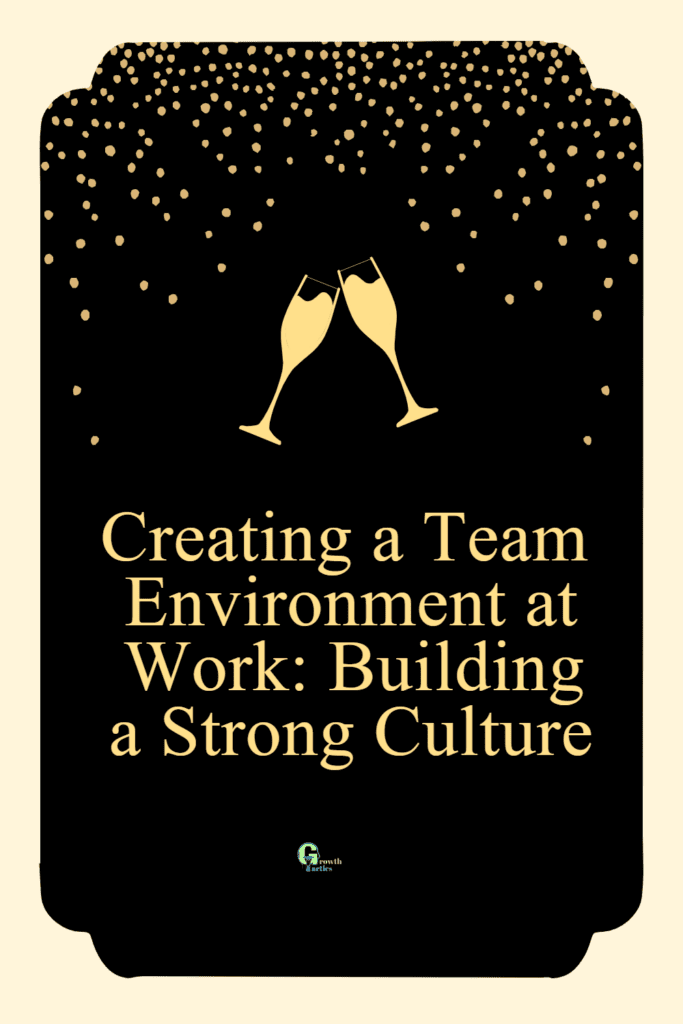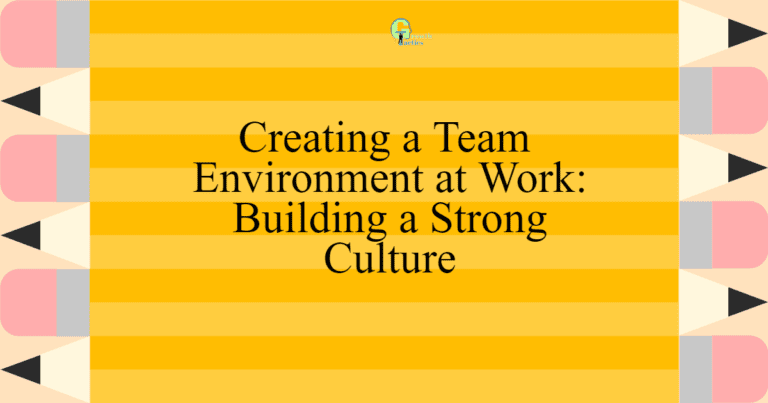Welcome to our discussion on team culture and the importance of fostering a positive work environment. Teamwork is an essential part of any successful organization, and building a strong team culture can lead to increased productivity, engagement, and overall success. In this article, we will explore tips for working in a team environment to create a more collaborative and productive work environment, key teamwork skills, and best practices to ensure that every team member contributes to the team’s goals effectively.
Jump To Section
Defining a Team Environment and Teamwork in the Workplace
A team environment is a setting where individuals come together to work collectively toward a common goal. It emphasizes collaboration, communication, and cooperation among team members. In a team environment, there is a shared sense of purpose and a commitment to supporting one another.
Teamwork in the workplace refers to the ability of individuals to work effectively and harmoniously in a team setting. It involves leveraging the strengths and expertise of each team member to achieve desired outcomes. Successful teamwork requires open and transparent communication, mutual respect, and a willingness to collaborate.
In a team environment, every team member plays a crucial role. Each person brings unique skills, perspectives, and experiences to contribute to the collective efforts of the team. It is important to recognize and value the diverse contributions of team members to foster a sense of inclusivity and belonging.
Teamwork in the workplace is not limited to specific roles or tasks. It encompasses all aspects of the work process, including planning, problem-solving, decision-making, and execution. By working together and pooling their strengths, teams can overcome challenges, find innovative solutions, and achieve better results.
Having a strong team environment and promoting effective teamwork in the workplace is vital for organizational success. It leads to improved communication, increased productivity, and enhanced employee satisfaction. When individuals feel supported, motivated, and connected within a cohesive team, they are more likely to achieve their goals and exceed expectations.
In the next section, we will explore the key elements of a collaborative and positive work environment and how they contribute to fostering effective teamwork.
Elements of a Collaborative and Positive Work Environment
A collaborative and positive work environment is essential for fostering effective teamwork. It creates a culture that encourages open communication, trust, and mutual respect among team members. Here are some key elements that contribute to a collaborative and positive work environment:
- Clear Goals and Roles: Teams should have a clear understanding of their goals and each team member’s role in achieving those goals. By establishing clear expectations and responsibilities, team members can align their efforts and work towards a common purpose.
- Effective Communication: Open and transparent communication is vital for successful teamwork. Team members should feel comfortable expressing their ideas, concerns, and feedback. Regular team meetings, one-on-one discussions, and utilizing collaborative communication tools can facilitate effective communication within the team.
- Trust and Psychological Safety: Trust is the foundation of a collaborative work environment. Team members should trust each other’s capabilities, intentions, and commitments. A psychologically safe environment encourages individuals to take risks, share their opinions, and learn from mistakes without the fear of being judged or punished.
- Supportive Leadership: Effective leadership plays a crucial role in creating a positive work environment. Leaders should provide support, and guidance, and empower team members to make decisions. They should promote a culture of inclusivity, recognize achievements, and provide constructive feedback to foster growth and development.
- Collaboration and Cooperation: Encouraging collaboration and cooperation among team members is essential. This involves promoting teamwork, encouraging knowledge sharing, and creating opportunities for cross-functional collaboration. Collaboration tools and platforms can facilitate seamless collaboration even in remote or dispersed teams.
- Recognition and Rewards: Recognizing and rewarding individual and team contributions is important for maintaining motivation and morale. Celebrating achievements, acknowledging hard work, and providing constructive feedback can boost team morale and foster a positive work atmosphere.
- Work-Life Balance: Striking a balance between work and personal life is crucial for employee well-being. Supporting flexible work arrangements, encouraging breaks, and promoting a healthy work-life balance can contribute to a positive work environment and help prevent burnout.
By cultivating these elements in the work environment, organizations can create a culture that promotes collaboration, innovation, and high-performance teamwork. In the next section, we will explore essential teamwork skills and how they contribute to overall team success.
Building a Strong Team Culture and Teamwork Skills
A strong team culture and the development of teamwork skills are essential for fostering effective collaboration and achieving team success. Here are some strategies and skills that can help build a strong team culture and enhance teamwork skills:
- Establish Shared Values and Norms: Define and communicate the values, norms, and expectations that guide the team’s behavior. These shared values help create a cohesive team culture and promote a sense of belonging and unity.
- Foster Trust and Respect: Trust and respect are fundamental for successful teamwork. Encourage open and honest communication, active listening, and empathy among team members. Emphasize the importance of treating everyone with respect and valuing diverse perspectives.
- Promote Collaboration and Cooperation: Encourage a collaborative mindset where team members work together towards shared goals. Foster an environment that values cooperation, knowledge-sharing, and leveraging individual strengths for the benefit of the team.
- Develop Effective Communication Skills: Strong communication skills are crucial for effective teamwork. Encourage clear and concise communication, active listening, and the ability to express ideas and concerns constructively. Provide training or resources to improve communication skills within the team.
- Nurture Problem-Solving Skills: Effective problem-solving is a key teamwork skill. Provide opportunities for the team to tackle challenges together, brainstorm solutions, and make decisions collectively. Encourage a growth mindset that embraces learning from failure and finding innovative solutions.
- Foster Conflict Resolution Skills: Conflict can arise in any team, but having the ability to address and resolve conflicts constructively is vital for maintaining a positive team environment. Encourage open dialogue, active listening, and finding win-win solutions when conflicts arise.
- Promote Accountability and Responsibility: Each team member should understand their individual responsibilities and be accountable for their work. Foster a culture of ownership, where team members take pride in their contributions and hold each other accountable to achieve team goals.
- Celebrate Success and Learn from Failure: Recognize and celebrate team achievements to boost morale and motivation. Similarly, encourages a culture of learning from failures and using them as opportunities for growth and improvement.
- Provide Training and Development Opportunities: Support the team’s growth by providing training and development opportunities that enhance teamwork skills. This could include workshops, coaching sessions, or team-building activities that focus on improving collaboration, communication, and problem-solving abilities.
By actively cultivating a strong team culture and developing teamwork skills, organizations can foster an environment that supports collaboration, innovation, and high-performance teamwork. The next section will explore strategies for effective team collaboration and how to overcome common challenges that teams may face.
Working in a Team Environment Effectively
Working effectively in a team environment requires a combination of skills, attitudes, and strategies. Here are some key strategies to help individuals work effectively in a team environment:
- Active Participation: Be an active and engaged team member. Contribute ideas, ask questions, and offer solutions. Actively listen to others and give them the opportunity to express their perspectives. Show genuine interest and support for the team’s goals.
- Clear Communication: Practice clear and concise communication to ensure everyone is on the same page. Use active listening skills to understand others’ viewpoints and ideas. Be open to giving and receiving feedback, and be respectful when providing input or suggestions.
- Flexibility and Adaptability: Be open to change and willing to adapt to new situations. Embrace different work styles and perspectives within the team. Flexibility allows the team to adjust to challenges and find creative solutions in a constantly evolving work environment.
- Collaboration and Cooperation: Work collaboratively with team members, sharing knowledge, and resources. Seek opportunities to cooperate with others, providing support and assistance where needed. Foster a sense of camaraderie and trust within the team.
- Time Management: Effectively manage your time and prioritize tasks to meet deadlines. Avoid procrastination and communicate openly with the team if there are any challenges or delays. Being organized and proactive can help ensure the team’s success.
- Conflict Resolution: Conflicts can arise in a team setting. When conflicts occur, address them promptly and constructively. Use active listening skills, empathy, and open communication to find mutually beneficial resolutions. Focus on finding solutions rather than assigning blame.
- Respect and Appreciation: Show respect for all team members and their contributions. Recognize and appreciate the strengths and skills of others. Celebrate achievements and express gratitude for the hard work and efforts of the team.
- Trust and Support: Build trust within the team by fulfilling commitments and being reliable. Offer support to team members when needed, and be willing to seek assistance when necessary. Trust and support create a supportive and collaborative team environment.
- Continuous Learning: Take advantage of opportunities to learn and grow professionally within the team. Seek feedback, engage in self-reflection, and actively pursue knowledge and skills that contribute to the team’s success. Embrace a growth mindset and encourage others to do the same.
By applying these strategies, individuals can contribute to a positive team environment and work effectively towards achieving team goals. Remember, effective teamwork requires ongoing effort and a commitment to open communication, collaboration, and mutual respect.
Conclusion
In conclusion, building a strong team culture and developing teamwork skills are essential for fostering effective collaboration and achieving team success. By implementing these strategies and fostering a positive team environment, organizations can unlock the full potential of their teams and achieve remarkable results.


